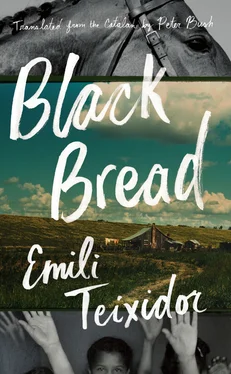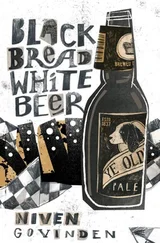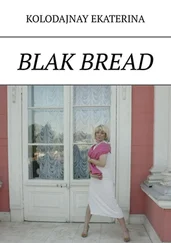After he’d wound up his final speech, the teacher let us go and create a racket in the playground, while he stood in the doorway watching us, as if he was supervising us, but I noticed something special about his gaze and couldn’t think what it was.
When it was home time, we cleaned out our desks and the teacher also stuffed an old leather briefcase with the equipment from his table, books, rulers, pens and nibs, rubbers and blotting paper, all he had, and put the chessboard and the box of pieces next to it, as if he was about to set out on a journey. Then he positioned himself at one side of the door and shook our hands; the teacher had a farewell word for us one by one, “goodbye!” “be good!” or “work hard!”
Cry-Baby was one of the first to leave and the teacher, Mr. Madern, stroked her cheek as he told her something I didn’t catch. Núria blushed, looked down, and shook his hand. When it was my turn, he stared into my eyes as he held out his hand and that was when I regretted being bereft of everything I’d just felt, even of the words to express a glimmer of that hatred, but I couldn’t, my rage had melted as if his presence had spirited away all my evil thoughts, and thus disarmed, I simply squeezed his hand and listened to what he had to say.
“I know it’s all going well,” he said, and I listened to him from afar, as if he were speaking to somebody else or standing elsewhere and his words were coming to me from a way away, “Make the most of it and get on. Think of all the boys who have to live in a boarding school, far from home, in order to keep on studying. I’ll be in the village for a couple of days before I leave. If you need anything, come and see me. As you know, I live at the inn.”
I nodded, and was angry at myself for so doing, but I couldn’t help it, and when our hands parted and I was leaving, he added in a gentler tone: “Your cousin, Núria, is a good lass.”
That was like a stab in the back. I couldn’t understand why he said that. Cry-Baby waited for me at the start of the path to the farm and she followed me, not saying a word, when I walked by. Later, past the first bend, I asked her: “What did he say to you?”
“Nothing,” she said, averting her gaze. “He wished me luck, in case we don’t meet up again.”
I hesitated, trying to find something to say in reply. In the end, I asked: “And why should you two meet up again?”
This time she did look at me, and didn’t seem in the least put out. Now she asked: “And when will you be off?”
“Next term, I reckon,” I said reluctantly. “But we’ll meet up again. I’ll probably come and play with you on Sundays.”
“Quirze says you’ll never come back.”
“What does that idiot know! He knows nothing.”
That year the summer holidays didn’t open up an endless vista of light, the days and days of fun and games that usually awaited us. Summer was the time that most resembled the eternity priests, teachers and friars talked about. Months without end of parties and possibilities offered by a sunny season that even lit up our nights. That final year was the end of eternity. We’d just begun our holidays and were already thinking about how they were going to end, of a different beginning that might part us forever.
All in all it made us forget that Aunt Enriqueta had vanished. They were days when rather than her absence, we felt a dense, malignant atmosphere throughout the house. Silences were longer and dragged more; conversations were tighter-lipped. Nobody mentioned Aunt Enriqueta, only Grandmother said something one day to Cry-Baby and me, as if someone had already told us something about her situation: “She’ll be back, Aunt Enriqueta, she’ll be back. They’ve taken her to Vic and Barcelona for a few weeks where she’s got work to do, work that’s urgent, because apparently Father Tafalla has ordered clothes for an entire monastery that is departing to the Americas. She’ll be back.”
That Sunday Mother came and spent more time with me than usual. On other occasions, when she arrived, I sometimes didn’t even notice her, and bumped into her in the kitchen talking to Aunt Ció or Grandmother, and I’d say hello and go back to playing with my cousins up the plum tree or in the stable if we had work to do, but that day Mother didn’t let me out of her sight. She kept her arm round my waist while we sat on the kitchen bench talking to Aunt Ció, who was preparing lunch with her back to us. In their usual fashion, they spoke about Aunt Enriqueta without naming her, in an indirect, dispassionate way, as if she were a distant relative who was ill, with an illness that couldn’t be named
“You didn’t expect that, did you?”
“Not in a thousand years would I have expected anything of that sort. I was expecting everything but that.”
“You’d never have imagined it was him , would you?”
“He’d been here a few times, not that much, and he seemed like a wet little sparrow, a lambkin, with his short ears and nice as pie… And look how he’s turned out! I’d never ever imagined he had it in him to play such nasty trick.”
“Had you ever seen them together?”
“Never, I tell you, not once. You know he never came by himself, he couldn’t, it wasn’t allowed. He always came with the other older…the big…” Aunt Ció swung round to look at Mother, and smiling sweetly made a round belly shape with her hands. “They were always together. He was his companion. A kind of secretary, almost, you might say.”
“They must have met up somewhere else, in the woods…”
“I began to have my suspicions when she was so quick to agree to go to your house in town and keep you company.”
“You caught a whiff…?”
“Do you mean…? I don’t think so. She always arrived at the same time, on the dot. On the coach.”
“Heavens knows what she told them at the seamstress’s in Vic. She had the whole day to herself. To herself and to do whatever she liked, clearly. I’d bet my right hand she didn’t go to the seamstress’s at midday or on many an afternoon.”
Aunt Ció, her back turned, made a gesture of resignation, as if to say that must be right, that there could be no other explanation. I acted the innocent but hung on each word and gesture, trying to extract some sense to work it all out. I thought they were referring to Canary, the blond civil guard, and his colleague, since they always went about together.
“Dad Quirze lost his rag. You can’t imagine how furious he was. We didn’t get any sleep all night. We had a huge row! It made my poor mother ill, and she doesn’t know the half of it.”
Once again, my mother’s presence introduced the enclosed world of adults, with its language of hidden meanings and knowing references, to events only they knew, interpreted and evaluated. I felt excluded from that world and my exclusion removed any responsibility for the fates of those people, whether present or absent, as if they were saying I didn’t belong to their kind, wasn’t party to their worries, their interests, their dangers, their blood, and their prerogatives, as Grandmother Mercè would say. Each hour that passed I felt cast farther adrift. Was this one way to force me gradually into the world of Mr. and Mrs. Manubens?
“So then, there’s nothing we can do, right?”
“Now we must let time go by… It’s all we can do.”
“And what will you do? I mean to cover it up, when what must be, must be… Have you tried…?” Mother asked, insinuating something or other. “King’s crown works wonders in these cases. It really does the business. And there’s a woman in Vic you can rely on…”
Aunt Ció made that resigned-to-fate gesture once again. Now she turned round, rubbed her hands on her apron and said: “You know what these people are like. They don’t want a hue-and-cry, or anything putting them in a bad light. And you know that we owe them a lot of favours. They’ve done deals with Dad Quirze on both sides of the mountains, and Grandfather Hand acts as their messenger boy though he’s not a clue what he’s carrying. It seems they need to send lots of things over the other side on the quiet, no people, just things, papers, banking stuff, that is, all underhand. That lot trust nobody, not even their own. Fonso couldn’t have escaped without their help. We owe them too many bits of help. We can’t do a thing without their blessing.”
Читать дальше












